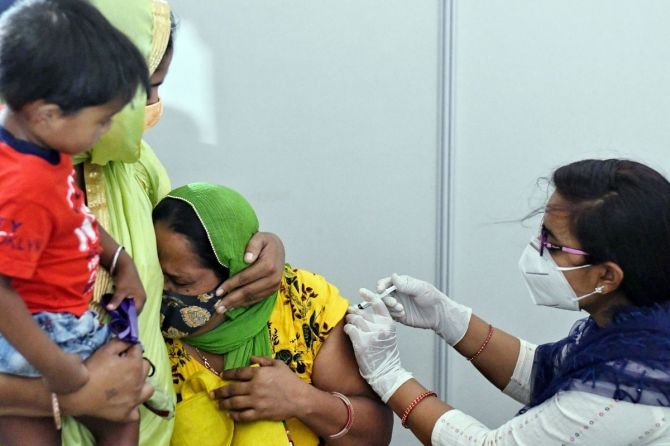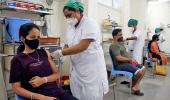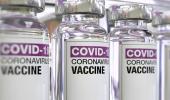Experts, however, feel that given the intensity of the second wave and the high single dose coverage, India is in a good position to avoid any drastic wave in the near future.
Ruchika Chitravanshi, Sohini Das and Ishaan Gera report.

From hoisting the tricolour on Red Fort to announcements in public places, the Union government has lined up large-scale celebrations as India inches closer to the milestone of administering 1 billion doses of Covid vaccines.
India launched its Covid-19 vaccination drive on January 16.
Of the doses given so far (at 6 pm on the CoWIN dashboard), the proportion of second doses was 28.8 per cent, effectively taking the share of India's fully vaccinated population to 29.9 per cent.
By now, 74 per cent of the eligible population of India (aged 18 and above) has received their first dose of the Covid vaccine.
If India wants to reach even within the shouting distance of achieving its target of vaccinating the entire adult population by the end of the year, the vaccination drive going forward would have to prioritise second doses.
Experts, however, feel that given the intensity of the second wave and the high single dose coverage, India is in a good position to avoid any drastic wave in the near future.
"India has done a good job in vaccinating its adult population. Strategically, even one dose vaccination, combined with the high level of natural infections, will give us enough protection," epidemiologist Jayprakash Muliyil said.
The share of fully vaccinated persons could increase much faster if the dose interval was reduced from the current gap of 12 to 16 weeks.
The health ministry has said the matter is under their constant watch and scientific scrutiny.
Public health experts have said it is time that the government started thinking about the option of booster doses, at least for those who were vaccinated early in the year and immuno-compromised adults.
"We should generate data on the elderly in India who have received Covaxin. Covaxin is very different from Sinopharm and Sinovac vaccines. But those two inactivated vaccines have not performed well in terms of long-term protection, particularly for the elderly.
"We have given Covaxin to a lot of the elderly, and we need to generate data on vaccine effectiveness for that so that we can decide whether we need a booster dose or not," said Gagandeep Kang, microbiologist and professor at Christian Medical College, Vellore.
Globally, several nations, such as the United States and Israel, have started administering booster doses, despite the World Health Organisation asking the countries to ensure that poor countries should get access to vaccines first.
As of now, the government has said there are no plans for a booster dose and the focus is on vaccinating as many as possible.
With the talk of giving the jab to children gaining currency, there are also concerns among health experts about safety.
India could be the first country in the world to vaccinate children between 2 and 18 years with Covaxin getting the emergency use approval.
While Zydus Cadila is yet to launch its vaccine for adolescents in the market even though it has got the approval, Serum Institute's clinical trials on children for Covovax, the Novavax candidate, would be over around January.
Supply situation
While Covishield is the dominant vaccine being given in India, the supply of Bharat Biotech's Covaxin has not been able to supply as expected.
The company said that in October, it would supply 55 million doses to the COVID-19 vaccination programme.
This is still less than 58 million doses per month that the government expects from Bharat Biotech.
By December, Bharat Biotech claims it would touch 1 billion annual doses capacity at its sites barring its partners.
Covaxin is an inactivated whole virus vaccine, and the technology platform takes time to manufacture, and the yield is less.
In contrast, the Serum Institute of India was making around 60 million doses of Covishield a month, which then steadily ramped up to 90 million a month around July, and by September, it touched 160 million monthly doses.
In October, SII is set to supply 200 million doses of Covishield.












 © 2025
© 2025